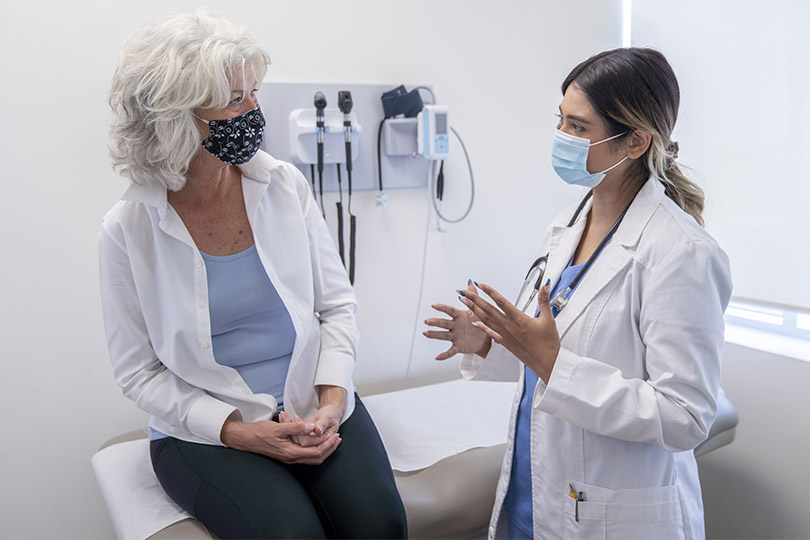Specialized Neurology Testing
Appointments
Specialized Care for Neurology
For specialized testing, the Department of Neurology works with specialists in neuropsychology, neurophysiology and other areas.
Neuropsychology
Expertly trained in brain anatomy, function, injury and disease, neuropsychologists are integral to Lahey Hospital & Medical Center’s neuroscience team. Working collaboratively with neurologists, neurosurgeons and psychiatrists, they comprehensively evaluate patients with symptoms of cognitive and/or behavioral dysfunction for the purpose of differential diagnosis, neurosurgical intervention, medical or rehabilitation treatment.
Our neuropsychologists are experienced in Wada testing and functional MRI evaluations and offer expertise in the following conditions:
- Memory disorders
- Dementia
- Alzheimer’s disease
- Frontotemporal dementia
- Progressive aphasia
- Mild cognitive impairment
- Epilepsy
- Multiple sclerosis
- Movement disorders
- Parkinson’s disease
- Progressive supranuclear palsy (PSP)
- Cortical-basal ganglionic degeneration (CBGD)
- Tremor
- Cerebrovascular disease
- Vascular dementia
- Stroke
- Aneurysm
- Traumatic and acquired brain injury
- Liver disease
- HIV/AIDS
- Brain tumors
- Psychiatric disorders
- Toxin exposure
- Other medical conditions that may impact cognition
Neuropsychological evaluations are a noninvasive way to assess an individual’s cognitive abilities (e.g., attention, memory, language, organization/planning, reasoning abilities). Upon completion of such an evaluation, the neuropsychologist draws conclusions regarding the patient’s cognitive strengths and weaknesses and develops treatment recommendations for the patient, his or her family, and other members of the patient’s health care team. Aside from helping to guide treatment, these key recommendations are also used to help the patient in his or her daily life.
Neurophysiology Labs
Lahey Hospital & Medical Center’s Neurology Department houses a comprehensive, state-of-the-art neurophysiology laboratory. Our testing includes EEG (electroencephalography), EMG (electromyography and nerve conduction studies), evoked potentials, sleep labs, transcranial Doppler, autonomic testing labs and quantitative sensory testing.
Physicians with subspecialty training and board certification in these specialized areas supervise the labs, and a staff of neurophysiology technologists administer tests. Upon referral from a neurologist or other physician, patients are tested for seizures, nerve/muscle diseases and brain circulation disorders. These tests are very helpful in guiding us toward an appropriate diagnosis and treatment plan for each of our patients.
Lahey Hospital & Medical Center’s Sleep Disorders Center is fully accredited as both a clinical center and a sleep laboratory, and tests up to 10 patients per night for sleep apnea and other sleep-related diseases. Clinical consultations in the Departments of Neurology, Pulmonary Medicine, Otolaryngology, Psychiatry and related fields are offered by the Sleep Disorders Center, as well.
Neurophysiology Tests & Neurovascular Ultrasounds
EEG is the testing of brain waves for epilepsy and other conditions and is done both in outpatient and inpatient settings, the latter encompassing a long-term video-EEG monitoring unit.
EMG (electromyography and nerve conduction studies) is when the evaluation of diseases of nerves and muscles, such as peripheral neuropathy and radiculopathy (pinched nerves), is performed. Quantitative sensory testing is also done for peripheral neuropathy.
The evoked potential test is when electrodes are placed on the head to record brain waves in order to measure the amount of time it takes for nerves to respond to stimulation. Nerves in various parts of the body may be tested.
The Sleep Lab offers overnight and all-day testing for sleep apnea, narcolepsy and other sleep disorders.
Autonomic testing is performed for peripheral neuropathy and other symptoms, including fainting.
TCD (transcranial Doppler) and carotid ultrasound involves ultrasound evaluation of the circulation within the brain, and is used in patients who have had a stroke.

